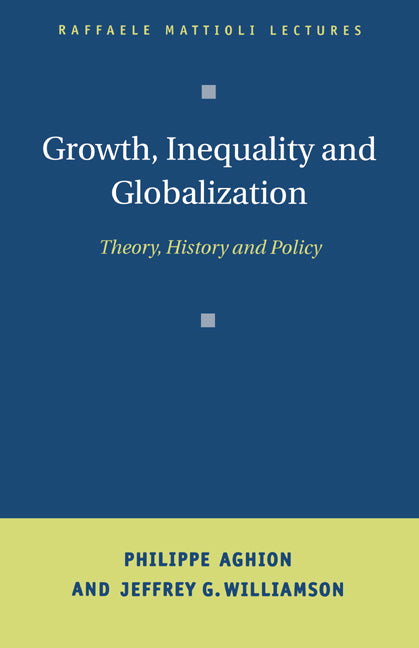Freshly Printed - allow 8 days lead
Couldn't load pickup availability
Growth, Inequality, and Globalization
Theory, History, and Policy
Two of the world's leading economists discuss fundamental issues of inequality and economic growth.
Philippe Aghion (Author), Jeffrey G. Williamson (Author)
9780521650700, Cambridge University Press
Hardback, published 8 April 1999
216 pages, 3 tables
22.4 x 14.6 x 2 cm, 0.41 kg
"Recommended for upper-division undergraduate and graduate collections." Choice
The question of how inequality is generated and how it reproduces over time has been a major concern for social scientists for more than a century. Yet the relationship between inequality and the process of economic development is far from being well understood. These Raffaele Mattioli Lectures have brought together two of the world's leading economists, Professors Philippe Aghion (a theorist) and Jeffrey Williamson (an economic historian), to question the conventional wisdom on inequality and growth, and address its inability to explain recent economic experience. Professor Aghion assesses the affects of inequality on growth, and asks whether inequality matters: if so why is excessive inequality bad for growth, and is it possible to reconcile aggregate findings with macroeconomic theories of incentives? In the second part Jeffrey Williamson discusses the Kuznets hypothesis, and focuses on the causes of the rise of wage and income inequality in developed economies.
Preface G. Toniolo
Introduction P. Aghion and J. G. Williamson
Part I. Inequality and Economic Growth P. Aghion
1. Introduction
2. Inequality, incentives and growth
3. Technical change and the Kuznets hypothesis reconsidered
4. Conclusions
References
Part II. Globalization and the Labor Market: Using History to Inform Policy J. G. Williamson
5. Globalization, labor markets and convergence in the past
6. Globalization and the causes of workers' living standard: convergence in the past
7. Policy backlash: can the past inform the present?.
Subject Areas: Economic history [KCZ], Political economy [KCP], Macroeconomics [KCB], Economic theory & philosophy [KCA]


